|
Little new economic data during the week left market participants to look elsewhere for trading stimulus. Many investors idled while they waited for the weekend's Kansas City Fed symposium in Jackson Hole, Wyoming and the presentations of Fed Chair Janet Yellen and ECB President Mario Draghi. Ms Yellen spoke Friday morning on financial stability and Mr Draghi, at luncheon on global growth. This year's symposium topic is "Fostering a Global Economy".
Ms Yellen spoke first. In her presentation, she did not discuss either the U.S. economic outlook or Fed policy. Rather, she stuck to the title of her talk — Financial Stability a Decade after the Onset of the Crisis. She said that the reforms put in place after the 2007 to 2009 crisis strengthened the financial system without impeding economic growth and that any future changes should remain modest. She did concede, amid pressures from the administration to deregulate the financial industry, that there may be benefits to simplifying the Volcker Rule which limits proprietary trading by banks.
Mr Draghi spoke later in the day, saying that the global recovery is firming up but warning that the openness of markets is a key concern. Mr Draghi said that advanced economies must remain open to international trade. However he noted that openness to trade is under threat and a turn toward protectionism would pose a serious threat to the global economy. In his speech he did not comment on current monetary policy either.
Most equity indexes advanced on the week. Gains ranged from 0.2 percent (STI and Sensex) to 3.0 percent (Hang Seng). On the down side, losses ranged from down 0.37 point to 0.4 percent (KLCI and IBEX).
| |
|
2016 |
2017 |
% Change |
|
Index |
Dec 31 |
Aug 18 |
Aug 25 |
Week |
2017 |
| Asia/Pacific |
|
|
|
|
|
|
| Australia |
All Ordinaries |
5719.1 |
5798.5 |
5803.4 |
0.1% |
1.5% |
| Japan |
Nikkei 225 |
19114.4 |
19470.4 |
19452.6 |
-0.1% |
1.8% |
|
Topix |
1518.61 |
1597.36 |
1597.0 |
0.0% |
5.2% |
| Hong Kong |
Hang Seng |
22000.6 |
27047.6 |
27848.2 |
3.0% |
26.6% |
| S. Korea |
Kospi |
2026.5 |
2358.4 |
2378.5 |
0.9% |
17.4% |
| Singapore |
STI |
2880.8 |
3252.0 |
3259.6 |
0.2% |
13.1% |
| China |
Shanghai Composite |
3103.6 |
3268.7 |
3331.5 |
1.9% |
7.3% |
|
|
|
|
|
|
|
| India |
Sensex 30 |
26626.5 |
31524.68 |
31596.1 |
0.2% |
18.7% |
| Indonesia |
Jakarta Composite |
5296.7 |
5893.8 |
5915.4 |
0.4% |
11.7% |
| Malaysia |
KLCI |
1641.7 |
1776.2 |
1769.2 |
-0.4% |
7.8% |
| Philippines |
PSEi |
6840.6 |
8016.7 |
8015.1 |
0.0% |
17.2% |
| Taiwan |
Taiex |
9253.5 |
10321.3 |
10515.5 |
1.9% |
13.6% |
| Thailand |
SET |
1542.9 |
1566.5 |
1575.9 |
0.6% |
2.1% |
|
|
|
|
|
|
|
| Europe |
|
|
|
|
|
|
| UK |
FTSE 100 |
7142.8 |
7324.0 |
7401.5 |
1.1% |
3.6% |
| France |
CAC |
4862.3 |
5114.2 |
5104.3 |
-0.2% |
5.0% |
| Germany |
XETRA DAX |
11481.1 |
12165.2 |
12167.9 |
0.0% |
6.0% |
| Italy |
FTSE MIB |
19234.6 |
21815.0 |
21746.5 |
-0.3% |
13.1% |
| Spain |
IBEX 35 |
9352.1 |
10385.7 |
10345.3 |
-0.4% |
10.6% |
| Sweden |
OMX Stockholm 30 |
1517.2 |
1532.1 |
1540.8 |
0.6% |
1.6% |
| Switzerland |
SMI |
8219.9 |
8874.4 |
8906.2 |
0.4% |
8.3% |
|
|
|
|
|
|
|
| North America |
|
|
|
|
|
|
| United States |
Dow |
19762.6 |
21674.51 |
21813.7 |
0.6% |
10.4% |
|
NASDAQ |
5383.1 |
6216.5 |
6265.6 |
0.8% |
16.4% |
|
S&P 500 |
2238.8 |
2425.6 |
2443.1 |
0.7% |
9.1% |
| Canada |
S&P/TSX Comp. |
15287.6 |
14952.3 |
15056.0 |
0.7% |
-1.5% |
| Mexico |
Bolsa |
45642.9 |
51075.5 |
51373.230 |
0.6% |
12.6% |
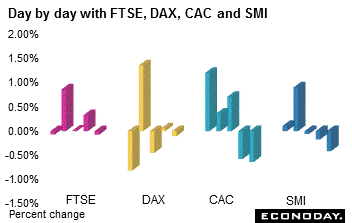 European equities were mixed for the week. Traders were reluctant to make any major moves ahead of speeches from Fed Chair Janet Yellen and ECB President Mario Draghi. While Ms Yellen spoke before markets closed on Friday, Mr Draghi's speech occurred after markets here were closed. On the week, the FTSE was up 1.1 percent, the SMI added 0.4 percent while the DAX was virtually unchanged (up 2.75 points). The CAC however, retreated 0.2 percent. European equities were mixed for the week. Traders were reluctant to make any major moves ahead of speeches from Fed Chair Janet Yellen and ECB President Mario Draghi. While Ms Yellen spoke before markets closed on Friday, Mr Draghi's speech occurred after markets here were closed. On the week, the FTSE was up 1.1 percent, the SMI added 0.4 percent while the DAX was virtually unchanged (up 2.75 points). The CAC however, retreated 0.2 percent.
The stock market gyrated between small gains and losses all week as traders waited for the Kansas City Fed symposium to begin on Thursday. The markets were looking for hints from Mr Draghi on when interest rates will rise in Europe. Ms Yellen spoke during Friday's trading hours, but she refrained from discussing monetary policy in her prepared remarks.
Since economic conditions have improved in the euro area, the ECB is facing questions about when and how it will start winding down its asset purchase program of €60 billion per month. Analysts noted that the ECB cannot continue to keep buying government bonds indefinitely at the current rate and are looking to Mr. Draghi to come up with an alternative solution to keep monetary policy loose without running out of government bonds to buy. At the same time, the ECB does not want to see an appreciation in the euro.
In a speech on Wednesday, Mr Draghi said that monetary and regulatory policy actions and steps in supervision undertaken over the last decade have made the world more resilient. However, he also said that central banks must continue preparing for new challenges.
 Trading last week was light as those investors not on vacation waited to hear what Fed Chair Yellen and ECB President Draghi would have to say on Friday. Markets in Asia were closed for the week before either spoke. Geopolitical risks also remained in focus after the United States announced new sanctions on Chinese and Russian entities for their alleged ties to North Korea's nuclear weapons program. Trading last week was light as those investors not on vacation waited to hear what Fed Chair Yellen and ECB President Draghi would have to say on Friday. Markets in Asia were closed for the week before either spoke. Geopolitical risks also remained in focus after the United States announced new sanctions on Chinese and Russian entities for their alleged ties to North Korea's nuclear weapons program.
Most equity indexes advanced last week with the exception of minimal declines in Japan (Nikkei down 0.1 percent and Topix down 0.27 point), Malaysia (down 0.4 percent) and the Philippines (down 1.59 points). For the Japanese indexes, it was their sixth consecutive weekly decline — the longest since January 2014. The Hang Seng (up 3.0 percent) and the Shanghai Composite (up 1.9 percent) led the gains.
In China, investors welcomed robust earnings from blue-chip firms, as well as signs that state-owned enterprise restructuring is picking up pace. Better prospects for China's economy also helped support the Hong Kong market, where many mainland firms are listed. This offset investor wariness ahead of global central bankers' speeches at the Jackson Hole, Wyoming symposium. On Thursday though,China's stocks fell the most in nearly two weeks as excitement over state enterprise reforms cooled. Investors were also cautious as the Shanghai benchmark neared the 3,300-point-mark, a level that has proven to be a stiff hurdle with three failed attempts to breach it over the past nine months.
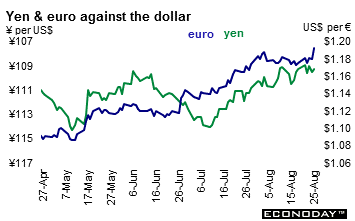 The U.S. dollar declined against the euro, pound sterling, Swiss franc and the Canadian and Australian dollars. It was unchanged against the yen. The U.S. currency tumbled on Friday after Fed Chair Janet Yellen, in her speech at the Jackson Hole Symposium, offered no clues about interest rates or the tapering the Fed's balance sheet even though many analysts had suspected that Ms Yellen would not say anything about policy before the Fed's next meeting in September. The U.S. currency tumbled even more Friday after ECB President Mario Draghi also did not discuss monetary policy. The euro hit its highest level against the U.S. dollar since January 2015 as he delivered his remarks. The U.S. dollar declined against the euro, pound sterling, Swiss franc and the Canadian and Australian dollars. It was unchanged against the yen. The U.S. currency tumbled on Friday after Fed Chair Janet Yellen, in her speech at the Jackson Hole Symposium, offered no clues about interest rates or the tapering the Fed's balance sheet even though many analysts had suspected that Ms Yellen would not say anything about policy before the Fed's next meeting in September. The U.S. currency tumbled even more Friday after ECB President Mario Draghi also did not discuss monetary policy. The euro hit its highest level against the U.S. dollar since January 2015 as he delivered his remarks.
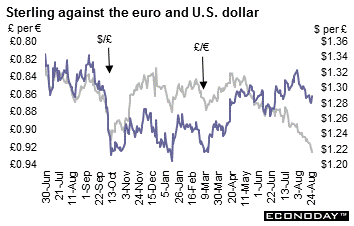 The pound declined for the fourth consecutive week against the euro as concerns over Brexit negotiations and tepid economic data weighed on the UK currency. Sterling touched its weakest level against the euro since October on August 23. The pound has had a rocky week as Brexit papers released by the UK government did little to ease doubts on whether it was enough to convince the European Union to allow trade talks to begin as soon as October. With the UK yet to clarify how much it will pay the EU as a Brexit bill, investors will closely scrutinize talks next week to gauge how smooth the negotiations will be. The pound declined for the fourth consecutive week against the euro as concerns over Brexit negotiations and tepid economic data weighed on the UK currency. Sterling touched its weakest level against the euro since October on August 23. The pound has had a rocky week as Brexit papers released by the UK government did little to ease doubts on whether it was enough to convince the European Union to allow trade talks to begin as soon as October. With the UK yet to clarify how much it will pay the EU as a Brexit bill, investors will closely scrutinize talks next week to gauge how smooth the negotiations will be.
|
|
2016 |
2017 |
% Change |
|
|
Dec 30 |
Aug 18 |
Aug 25 |
Week |
2017 |
| U.S. $ per currency |
|
|
|
|
|
|
| Australia |
A$ |
0.7215 |
0.794 |
0.794 |
0.1% |
10.1% |
| New Zealand |
NZ$ |
0.6948 |
0.732 |
0.725 |
-1.0% |
4.3% |
| Canada |
C$ |
0.7443 |
0.796 |
0.802 |
0.8% |
7.7% |
| Eurozone |
euro (€) |
1.0534 |
1.177 |
1.192 |
1.3% |
13.2% |
| UK |
pound sterling (£) |
1.2333 |
1.288 |
1.288 |
0.1% |
4.5% |
|
|
|
|
|
|
|
| Currency per U.S. $ |
|
|
|
|
|
|
| China |
yuan |
6.9450 |
6.670 |
6.647 |
0.4% |
4.5% |
| Hong Kong |
HK$* |
7.7533 |
7.824 |
7.821 |
0.0% |
-0.9% |
| India |
rupee |
67.9238 |
64.146 |
64.033 |
0.2% |
6.1% |
| Japan |
yen |
116.8100 |
109.190 |
109.220 |
0.0% |
6.9% |
| Malaysia |
ringgit |
4.4862 |
4.290 |
4.272 |
0.4% |
5.0% |
| Singapore |
Singapore $ |
1.4465 |
1.363 |
1.356 |
0.5% |
6.7% |
| South Korea |
won |
1205.8300 |
1141.320 |
1128.350 |
1.1% |
6.9% |
| Taiwan |
Taiwan $ |
32.3260 |
30.345 |
30.212 |
0.4% |
7.0% |
| Thailand |
baht |
35.8100 |
33.229 |
33.247 |
-0.1% |
7.7% |
| Switzerland |
Swiss franc |
1.0174 |
0.9655 |
0.9557 |
1.0% |
6.5% |
| *Pegged to U.S. dollar |
|
|
|
|
|
|
| Source: Bloomberg |
|
|
|
|
|
|
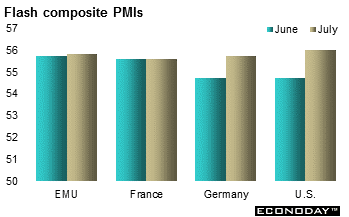 August flash composite PMI edged up to 55.8 from July's final of 55.7. Manufacturing climbed from a final July reading of 56.6 to 57.4 while services edged down to 54.9 from 55.4 in July. In manufacturing, both production and new orders rose at a faster rate in August than in July, boosted by the fastest rise in exports in six and a half years. Strong inflows of new work increased the backlog of orders at the strongest pace in 11 years. But despite the backlogs seen in manufacturing, accumulation of new business eased overall to the slowest pace since January, reflecting service sector softness. The flash composite PMI for France was unchanged at 55.6 while the pace in Germany picked up to 55.7 from 54.7. August flash composite PMI edged up to 55.8 from July's final of 55.7. Manufacturing climbed from a final July reading of 56.6 to 57.4 while services edged down to 54.9 from 55.4 in July. In manufacturing, both production and new orders rose at a faster rate in August than in July, boosted by the fastest rise in exports in six and a half years. Strong inflows of new work increased the backlog of orders at the strongest pace in 11 years. But despite the backlogs seen in manufacturing, accumulation of new business eased overall to the slowest pace since January, reflecting service sector softness. The flash composite PMI for France was unchanged at 55.6 while the pace in Germany picked up to 55.7 from 54.7.
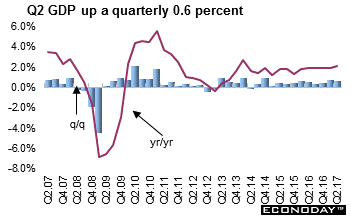 Second quarter gross domestic product was up an unrevised 0.6 percent on the quarter and 2.1 percent when compared with the same quarter a year ago. Unadjusted, annual growth of 0.8 percent was also in line with its flash report. Also left unrevised were the flash report's significant revisions for the prior quarter. First quarter's total output gain was revised up by a tick to 0.7 percent and the annual total output gain revised up by 0.3 percentage points to 2.0 percent. The positive contributions for the quarter came from domestic demand. A solid 0.8 percent gain in household consumption expenditures contributed 0.4 percentage points, while a 0.6 percent increase in government expenditures added 0.1 percentage points and an impressive 2.0 percent increase in capital investment contributed 0.4 percentage points. Within capital investment, fixed capital expenditures played less a role than in the prior quarter but still showed good gains on the quarter, with spending on machinery and equipment rising 1.2 percent and construction spending by 0.9 percent. Inventories, which pulled down the last quarter's results by 0.7 percentage points, had a positive impact this time and contributed 0.2 percentage points to growth. Overall domestic uses contributed a full percentage point to the second quarter gain. Real net foreign trade in contrast with the first quarter's 0.4 percentage point net contribution subtracted 0.3 percentage points from GDP growth during the quarter. Second quarter gross domestic product was up an unrevised 0.6 percent on the quarter and 2.1 percent when compared with the same quarter a year ago. Unadjusted, annual growth of 0.8 percent was also in line with its flash report. Also left unrevised were the flash report's significant revisions for the prior quarter. First quarter's total output gain was revised up by a tick to 0.7 percent and the annual total output gain revised up by 0.3 percentage points to 2.0 percent. The positive contributions for the quarter came from domestic demand. A solid 0.8 percent gain in household consumption expenditures contributed 0.4 percentage points, while a 0.6 percent increase in government expenditures added 0.1 percentage points and an impressive 2.0 percent increase in capital investment contributed 0.4 percentage points. Within capital investment, fixed capital expenditures played less a role than in the prior quarter but still showed good gains on the quarter, with spending on machinery and equipment rising 1.2 percent and construction spending by 0.9 percent. Inventories, which pulled down the last quarter's results by 0.7 percentage points, had a positive impact this time and contributed 0.2 percentage points to growth. Overall domestic uses contributed a full percentage point to the second quarter gain. Real net foreign trade in contrast with the first quarter's 0.4 percentage point net contribution subtracted 0.3 percentage points from GDP growth during the quarter.
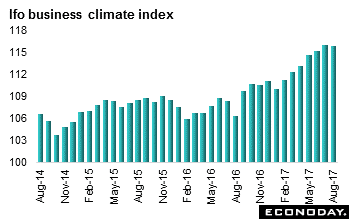 August Ifo survey business climate index was down from 116.00 to 115.9. The small decrease ends an uninterrupted string of monthly increases in the index since January. The decline reflects a 0.9 point drop in the survey's current conditions component to 124.6 — its first decrease in 12 months — and a 0.6 point increase in the business expectations component to 107.9, the fourth consecutive increase for this measure. Among the sector business sentiment readings of the survey, manufacturing (up 0.4 at 29.9) easily retained its leading position and again broke last month's record. Companies were slightly less satisfied with their current business situation, though it remained highly satisfying, while optimism grew. In retailing, the index dropped significantly (down 5.9 to 5.1), its weakest level since February, with car dealers largely responsible for the downswing. Retailers as a group were clearly less satisfied with their current business situation while their optimism about the short-term business outlook also waned. The construction component (up 2.9 to 17.3) continued in its record breaking run, with contractors far more satisfied with their current business situation, while also expecting business to pick up in the months ahead. August Ifo survey business climate index was down from 116.00 to 115.9. The small decrease ends an uninterrupted string of monthly increases in the index since January. The decline reflects a 0.9 point drop in the survey's current conditions component to 124.6 — its first decrease in 12 months — and a 0.6 point increase in the business expectations component to 107.9, the fourth consecutive increase for this measure. Among the sector business sentiment readings of the survey, manufacturing (up 0.4 at 29.9) easily retained its leading position and again broke last month's record. Companies were slightly less satisfied with their current business situation, though it remained highly satisfying, while optimism grew. In retailing, the index dropped significantly (down 5.9 to 5.1), its weakest level since February, with car dealers largely responsible for the downswing. Retailers as a group were clearly less satisfied with their current business situation while their optimism about the short-term business outlook also waned. The construction component (up 2.9 to 17.3) continued in its record breaking run, with contractors far more satisfied with their current business situation, while also expecting business to pick up in the months ahead.
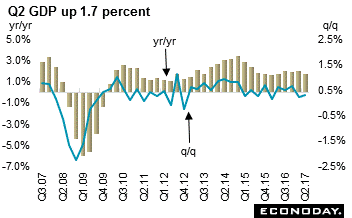 The second estimate of second quarter gross domestic product was unchanged from the initial estimate. GDP was up 0.3 percent on the quarter and 1.7 percent from the same quarter a year ago. Among the components of domestic demand, household consumption which comprises nearly two-thirds of GDP rose just 0.2 percent, down from 0.4 percent in the first quarter and its worst performance since the final quarter of 2014. Household spending thus accounted for a soft 0.1 percentage point of the total quarterly growth. Business investment was unchanged on the quarter, which was better than the expected decline in the wake of the Brexit vote, but down from the 0.6 percent increase recorded in the first quarter. Government spending rose 0.6 percent, less than the first quarter's 0.7 percent increase, but enough to add to 0.1 percentage point to total growth. Net trade had a neutral impact on GDP, with exports increasing by 0.7 percent while imports climbed by the same amount. Industrial output which comprises about 15 percent of GDP fell 0.3 percent in the second quarter with a neutral impact on total growth. But the output of services, comprising about 79 percent of total output, expanded by 0.5 percent in the second quarter, thereby adding 0.4 percentage points to total growth. The second estimate of second quarter gross domestic product was unchanged from the initial estimate. GDP was up 0.3 percent on the quarter and 1.7 percent from the same quarter a year ago. Among the components of domestic demand, household consumption which comprises nearly two-thirds of GDP rose just 0.2 percent, down from 0.4 percent in the first quarter and its worst performance since the final quarter of 2014. Household spending thus accounted for a soft 0.1 percentage point of the total quarterly growth. Business investment was unchanged on the quarter, which was better than the expected decline in the wake of the Brexit vote, but down from the 0.6 percent increase recorded in the first quarter. Government spending rose 0.6 percent, less than the first quarter's 0.7 percent increase, but enough to add to 0.1 percentage point to total growth. Net trade had a neutral impact on GDP, with exports increasing by 0.7 percent while imports climbed by the same amount. Industrial output which comprises about 15 percent of GDP fell 0.3 percent in the second quarter with a neutral impact on total growth. But the output of services, comprising about 79 percent of total output, expanded by 0.5 percent in the second quarter, thereby adding 0.4 percentage points to total growth.
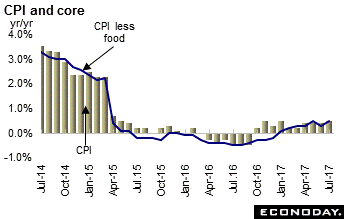 July consumer prices were up 0.4 percent on the year, unchanged from the increase recorded in both May and June. The seasonally adjusted CPI was flat on the month in July, also matching the May and June result. The annual change in food prices eased from 0.8 percent in June to 0.6 percent while prices for clothes & footwear were flat on the year after increasing by 0.2 percent in June. These declines were partly offset by a stronger increase in fuel, light & water charges, up from 3.5 percent to 4.3 percent while transportation & communication costs also picked up by 0.1 percent on the year in July after a 0.1 percent decline in June. Housing costs fell 0.2 percent on the year in July, as they did in June. Core CPI excluding fresh food was up 0.5 percent on the year after increasing 0.4 percent in June. July consumer prices were up 0.4 percent on the year, unchanged from the increase recorded in both May and June. The seasonally adjusted CPI was flat on the month in July, also matching the May and June result. The annual change in food prices eased from 0.8 percent in June to 0.6 percent while prices for clothes & footwear were flat on the year after increasing by 0.2 percent in June. These declines were partly offset by a stronger increase in fuel, light & water charges, up from 3.5 percent to 4.3 percent while transportation & communication costs also picked up by 0.1 percent on the year in July after a 0.1 percent decline in June. Housing costs fell 0.2 percent on the year in July, as they did in June. Core CPI excluding fresh food was up 0.5 percent on the year after increasing 0.4 percent in June.
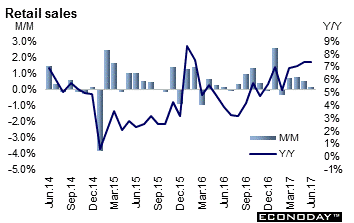 June retail sales were higher for the fourth consecutive month this time edging up a monthly 0.1 percent and were up 7.3 percent from a year ago. Monthly sales were up in 6 of 11 subsectors, representing 38 percent of total retail trade. Higher sales at general merchandise stores, clothing & clothing accessories stores and building material & garden equipment & supplies dealers offset lower sales at motor vehicle & parts dealers & gasoline stations. Excluding the latter two subsectors, retail sales were up 1.1 percent. In volume terms sales were up 0.5 percent. On an unadjusted basis, retail e-commerce sales were C$1.2 billion in June, accounting for 2.2 percent of total retail trade. On the year, retail e-commerce increased 43.5 percent, while total unadjusted retail sales rose 8.8 percent. Total sales were up 1.5 percent in the second quarter after rising 2.7 percent in the first quarter. On a real term basis, more relevant to GDP, sales rose 2.1 percent in the second quarter, the same as the previous quarter, including a 0.5 percent gain in June. June retail sales were higher for the fourth consecutive month this time edging up a monthly 0.1 percent and were up 7.3 percent from a year ago. Monthly sales were up in 6 of 11 subsectors, representing 38 percent of total retail trade. Higher sales at general merchandise stores, clothing & clothing accessories stores and building material & garden equipment & supplies dealers offset lower sales at motor vehicle & parts dealers & gasoline stations. Excluding the latter two subsectors, retail sales were up 1.1 percent. In volume terms sales were up 0.5 percent. On an unadjusted basis, retail e-commerce sales were C$1.2 billion in June, accounting for 2.2 percent of total retail trade. On the year, retail e-commerce increased 43.5 percent, while total unadjusted retail sales rose 8.8 percent. Total sales were up 1.5 percent in the second quarter after rising 2.7 percent in the first quarter. On a real term basis, more relevant to GDP, sales rose 2.1 percent in the second quarter, the same as the previous quarter, including a 0.5 percent gain in June.
Most equity indexes advanced in a quiet week for new economic information. Investors waited for remarks by Fed Chair Janet Yellen and ECB President Mario Draghi on Friday. Neither speaker gave a hint about their current and future monetary policies. The dollar tumbled on the week as uncertainty over the U.S. administration's ability to enact business friendly legislation weighed on the currency.
There will be an abundance of new economic information going forward especially about manufacturing output. The final manufacturing PMIs for August will be posted globally. Japan will release July data for unemployment, household spending, retail sales and industrial output. Canada will report second quarter gross domestic product. It is the last week of summer and everyone will be at their desks the following week.
| The following indicators will be released this week... |
| Europe |
|
|
| Aug 28 |
Eurozone |
M3 Money Supply (July) |
| Aug 29 |
France |
Consumption of Manufactured Goods (July) |
|
|
Gross Domestic Product (Q2.2017) |
| Aug 30 |
Eurozone |
EC Business and Consumer Confidence (August) |
| Aug 31 |
Eurozone |
Harmonized Index of Consumer Prices (August flash) |
|
|
Unemployment Rate (July) |
|
Germany |
Unemployment Rate (August) |
|
|
Retail Sales (July) |
| Sep 1 |
Eurozone |
Manufacturing PMI (August) |
|
Germany |
Manufacturing PMI (August) |
|
France |
Manufacturing PMI (August) |
|
UK |
Manufacturing PMI (August) |
| |
|
|
| Asia Pacific |
|
|
| Aug 29 |
Japan |
Household Spending (July) |
|
|
Unemployment Rate (July) |
| Aug 30 |
Japan |
Retail Sales (July) |
| Aug 31 |
Japan |
Industrial Production (July) |
|
China |
Manufacturing PMI (August) |
| Sep 1 |
Japan |
Manufacturing PMI (August) |
|
India |
Manufacturing PMI (August) |
| |
|
|
| Americas |
|
|
| Aug 29 |
Canada |
Industrial Products Price Index (July) |
| Aug 31 |
Canada |
Gross Domestic Product (Q2.2017) |
|
|
Monthly Gross Domestic Product (June) |
Anne D Picker is the author of International Economic Indicators and Central Banks.
|

